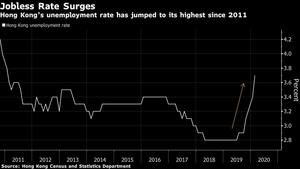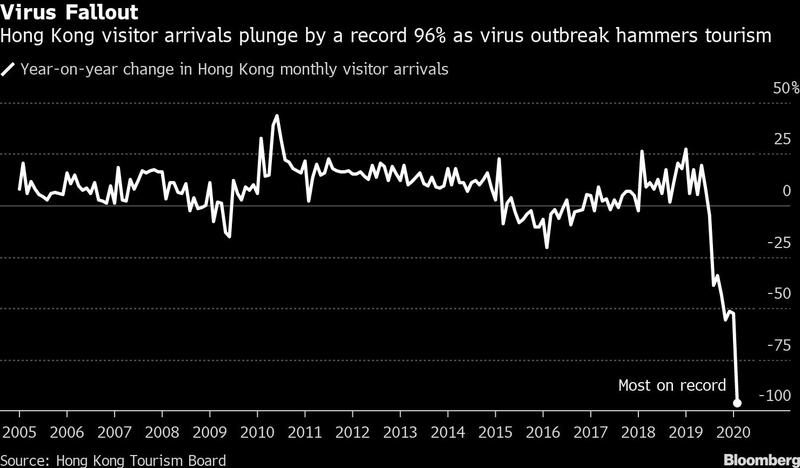
Hong Kong’s jobless rate surged to the highest level in almost a decade in February as the full force of disruptions from the novel coronavirus outbreak hit the city’s already struggling businesses.
The unemployment rate climbed to 3.7 percent for the December-to-February period, more than the median estimate of 3.6 percent among economists surveyed by Bloomberg. The fifth straight month of higher unemployment extends the longest such run since 2009, which occurred in the aftermath of the global financial crisis. The underemployment rate also rose to a five-year high of 1.5 percent.
Consumption and tourism-related sectors were the hardest hit, with the unemployment and underemployment rates of these sectors seeing a combined surge of 6.1% and 2.5% respectively, both the highest in about a decade
“The labor market deteriorated sharply, as the COVID-19 epidemic caused severe disruptions to a wide range of economic activities and dampened economic sentiment,” Law Chi-kwong, Secretary for Labour and Welfare, said in a government statement.
Looking ahead, Law said, "The labour market will be subject to even greater pressure in the near term, and the exact impact will hinge on the duration and severity of the pandemic around the world. The government will monitor the developments closely."
He cited the consumption and tourism-related sectors such as retail, accommodation and catering as hardest hit with the unemployment and underemployment rates of these sectors seeing a combined surge of 6.1 percent and 2.5 percent respectively, both the highest in about a decade.
Meanwhile, unemployment in construction “deteriorated drastically as construction activities saw a visible slowdown” while underemployment in transportation rose noticeably because of sharply reduced travel and cargo flows, Law said.
ALSO READ: Construction, retail hit hard as HK unemployment rises
In a blog post on Sunday, Financial Secretary Paul Chan warned the jobless rate would likely climb to its highest level in nine years in February, with hotels, retailers, restaurants and construction among the industries hit hardest. The underemployment rate is also likely on the rise, he said.
Another hit
The escalating global pandemic is the latest blow to Hong Kong’s economy, which plunged into recession last year after months of anti-government protests stemming from the extradition bill incident. The city’s economy is forecast to grow in a range of -1.5 percent to +0.5 percent this year, Chan forecast in the budget released in late February. The plan includes HK$120 billion (US$15.5 billion) in relief measures, with a HK$10,000 handout to permanent residents age 18 and older.
“The rise in the unemployment rate reflects how the economy is going through a severe downturn,” said Tommy Wu, a senior economist with Oxford Economics, before the jobless figures were released. “Obviously, those who lost their jobs will cut their spending. Even among people who are employed, they will also turn more cautious,” he said, because of the possibility of wage freezes, reductions in pay and further job cuts.
As the rest of the world struggles with the spread of COVID-19, Hong Kong’s early measures to combat the virus have shown some success partly because of memories of the deadly SARS virus in 2003. Currently, confirmed cases in Hong Kong are holding at 150 with four deaths, despite the city’s proximity to the Chinese mainland.
READ MORE: Mandatory quarantine for all arrivals in HK starting March 19
Those close economic ties with the mainland, however, also mean the success so far in keeping infections under control has not translated to similar upswings across key economic indicators.
 Visitor arrivals to Hong Kong plummeted a record 96 percent in February, according to the Hong Kong Tourism Board. Small-business sentiment also plunged to a record low last month, falling through the previous trough reached during months of unrest last year. January retail sales slid for a 12th straight month.
Visitor arrivals to Hong Kong plummeted a record 96 percent in February, according to the Hong Kong Tourism Board. Small-business sentiment also plunged to a record low last month, falling through the previous trough reached during months of unrest last year. January retail sales slid for a 12th straight month.
“While the number of COVID-19 cases in Hong Kong is relatively low compared to China and the rest of the world, Hong Kongers have remained very cautious and their daily lives are far from being normal,” Wu said. “I do think that the HK$10,000 stimulus would be a boost, and an expected bounce back in China’s economy in upcoming quarters might help. But the gloomy global picture is going to overshadow Hong Kong’s economic outlook and offset some of these positives.”


